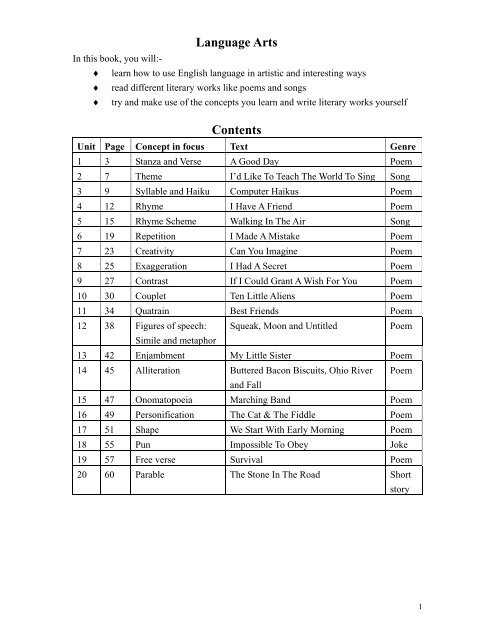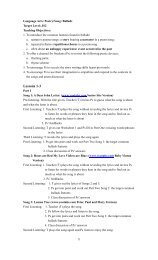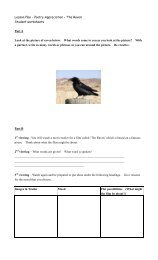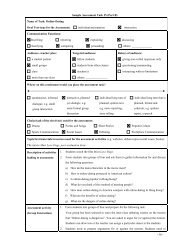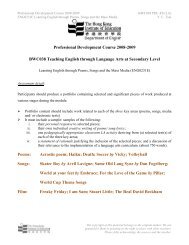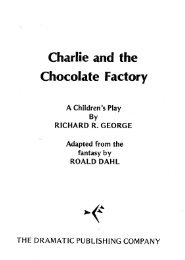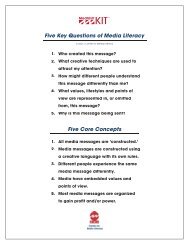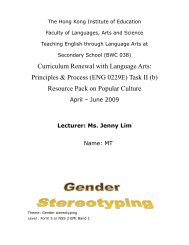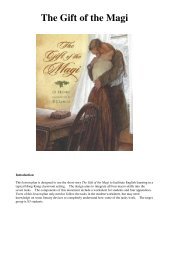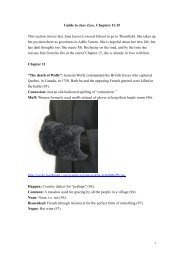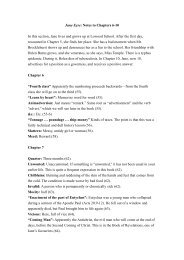You also want an ePaper? Increase the reach of your titles
YUMPU automatically turns print PDFs into web optimized ePapers that Google loves.
In this book, you will:-<br />
Language Arts<br />
♦ learn how to use English language in artistic and interesting ways<br />
♦ read different literary works like poems and songs<br />
♦ try and make use of the concepts you learn and write literary works yourself<br />
Contents<br />
Unit Page Concept in focus Text Genre<br />
1 3 Stanza and Verse A Good Day <strong>Po</strong>em<br />
2 7 Theme I’d Like To Teach The World To Sing Song<br />
3 9 Syllable and Haiku Computer Haikus <strong>Po</strong>em<br />
4 12 Rhyme I Have A Friend <strong>Po</strong>em<br />
5 15 Rhyme Scheme Walking In The Air Song<br />
6 19 Repetition I Made A Mistake <strong>Po</strong>em<br />
7 23 Creativity Can You Imagine <strong>Po</strong>em<br />
8 25 Exaggeration I Had A Secret <strong>Po</strong>em<br />
9 27 Contrast If I Could Grant A Wish For You <strong>Po</strong>em<br />
10 30 Couplet Ten Little Aliens <strong>Po</strong>em<br />
11 34 Quatrain Best Friends <strong>Po</strong>em<br />
12 38 Figures of speech:<br />
Simile and metaphor<br />
Squeak, Moon and Untitled <strong>Po</strong>em<br />
13 42 Enjambment My Little Sister <strong>Po</strong>em<br />
14 45 Alliteration Buttered Bacon Biscuits, Ohio River<br />
and Fall<br />
<strong>Po</strong>em<br />
15 47 Onomatopoeia Marching Band <strong>Po</strong>em<br />
16 49 Personification The Cat & The Fiddle <strong>Po</strong>em<br />
17 51 Shape We Start With Early Morning <strong>Po</strong>em<br />
18 55 Pun Impossible To Obey Joke<br />
19 57 Free verse Survival <strong>Po</strong>em<br />
20 60 Parable The Stone In The Road Short<br />
story<br />
1
Unit 1<br />
Part A Concept in focus – Stanza and Verse<br />
1. What is a stanza?<br />
A stanza is a group of lines of poetry forming a unit.<br />
2. What is the difference between stanza and paragraph?<br />
Stanzas in poems are like paragraphs in passages, but they look very different. In a<br />
stanza, the lines are separate, whereas in a paragraph, the lines just keep going on<br />
and on.<br />
3. What is verse?<br />
Another name for stanza is verse. In songs, we usually call the stanzas verses.<br />
Part B Concept Practice<br />
Practice 1 Look at the following two short bits of text. The contents are the same but<br />
their layouts are different. Which one is a stanza? Which one is a paragraph?<br />
1. You are the candle that’s glowing in my heart. When darkness<br />
surrounds me, you make it fall apart. I am much stronger from all<br />
that you impart. You are the candle that’s glowing in my heart.<br />
2. You are the candle that’s glowing in my heart.<br />
When darkness surrounds me,<br />
You make it fall apart.<br />
I am much stronger<br />
From all that you impart.<br />
You are the candle that’s glowing in my heart.<br />
___________<br />
___________<br />
Practice 2 Look at some of the poems and songs in this book and find out how many<br />
stanzas each has.<br />
Unit Text Number of stanzas<br />
2 I’d Like To Teach The World To Sing<br />
4 I Have A Friend<br />
5 Walking In The Air<br />
6 I Made A Mistake<br />
7 Can You Imagine<br />
2
Part C Text reading<br />
A<br />
Go o d Da y<br />
Peggy Field<br />
Today is one of my best days,<br />
(I’m trying to be good)<br />
I haven’t eaten 1 ________________ yet,<br />
My language has been good. 4<br />
I haven’t whined or been a grouch,<br />
I haven’t criticized.<br />
I haven’t nagged my family yet,<br />
I think I’ll 2 ________________. 8<br />
I haven’t used my credit card<br />
On foolish impulse buys.<br />
And I’ve been honest all day long,<br />
I haven’t told a 3 ________________. 12<br />
I haven’t yelled at 4 ________________,<br />
I’ve tried to keep my cool.<br />
And so far in this wond’rous day,<br />
I’ve lived the Golden Rule. 16<br />
I hope that I can 5 ________________ this up,<br />
And won’t break down instead,<br />
The hardest part is yet to come –<br />
When I get out of bed. 20<br />
Questions<br />
♦ anyone<br />
♦ chocolate<br />
♦ exercise<br />
♦ keep<br />
♦ lie<br />
Source: http://www.ilovepoetry.com/listpoems.asp?cat=Miscellaneous&subcat=Humor<br />
1. In this poem, there are altogether ____ stanzas. In each stanza, there are _____ lines.<br />
2. Does the narrator USUALLY do good things or bad things? (Note: narrator = the<br />
character in the story telling you what’s happening)<br />
___________________________________________________________________<br />
3. Why is the narrator so good today?<br />
___________________________________________________________________<br />
3
Vocabulary building<br />
In the poem, find words and phrases that match the meanings given.<br />
Vocabulary Line Meaning<br />
a. say what you don't like about something or someone<br />
b. treat others the way you want them to treat you<br />
c. (informal) a person who often complains<br />
d. buying something that you had not planned to buy,<br />
because you suddenly want it when you see it<br />
e. hasn’t come yet, will come later<br />
f. complain repeatedly in an annoying way<br />
g. until now<br />
h. make a long, high, sad sound<br />
i. very good<br />
j. shout<br />
Part D Self Reflection<br />
The following is a list of negative adjectives to describe people’s personality. See which<br />
ones fit the narrator of the poem, and which ones fit you. You can also use adjectives<br />
that are not listed below.<br />
1. arrogant<br />
2. bitter<br />
3. conceited<br />
4. cowardly<br />
5. cranky<br />
6. critical<br />
7. cruel<br />
8. demanding<br />
9. dishonest<br />
10. disobedient<br />
11. fussy<br />
12. gossipy<br />
13. greedy<br />
14. harsh<br />
15. hostile<br />
Bad traits of the narrator<br />
16. hot-tempered<br />
17. hypocritical<br />
18. impatient<br />
19. inconsiderate<br />
20. indecisive<br />
21. inflexible<br />
22. insincere<br />
23. irresponsible<br />
24. jealous<br />
25. judgmental<br />
26. manipulating<br />
27. nagging<br />
Bad traits of me<br />
28. naive<br />
29. never satisfied<br />
30. passive<br />
31. self-centred<br />
32. self-conscious<br />
33. selfish<br />
34. timid<br />
35. troublesome<br />
36. untidy<br />
4
Part E Your Try<br />
Requirements:<br />
1. Write your own poem to show your ideas of ‘a good day’.<br />
2. Write at least 2 stanzas. You can decide how many lines to have in each stanza.<br />
3. Remember the lines should be separate.<br />
A Good Day<br />
____________________________________________________________<br />
______________________________________________________________________<br />
______________________________________________________________________<br />
______________________________________________________________________<br />
______________________________________________________________________<br />
______________________________________________________________________<br />
____________________________________________________________<br />
____________________________________________________________<br />
______________________________________________________________________<br />
______________________________________________________________________<br />
______________________________________________________________________<br />
____________________________________________________________<br />
____________________________________________________________<br />
____________________________________________________________<br />
______________________________________________________________________<br />
______________________________________________________________________<br />
______________________________________________________________________<br />
____________________________________________________________<br />
____________________________________________________________<br />
____________________________________________________________<br />
____________________________________________________________<br />
____________________________________________________________<br />
5
Unit 2<br />
Part A Concept in focus – Theme<br />
What is theme?<br />
Theme is the main idea of a literary work.<br />
Part B Concept Practice<br />
The following are some common themes. Which ones are interesting to you? Which ones<br />
are boring? Put them in the table below.<br />
friendship, family, love, life, death, happiness, sadness, school life,<br />
money, environmental protection, poverty, growing up<br />
Interesting themes Boring themes<br />
Part C Text reading<br />
3<br />
6<br />
9<br />
12<br />
I'd Like To Teach the World To Sing (In Perfect Harmony)<br />
The New Seekers<br />
I'd like to build the world a 1 ______________<br />
And furnish it with love<br />
2 __________ apple trees and honey 3 ___________ and snow-white turtledoves<br />
I'd like to teach the world to sing<br />
In perfect harmony<br />
I'd like to hold it in my 4 ______________and keep it company<br />
I'd like to see the world for 5 ______________<br />
All standing hand in 6 ______________<br />
And hear them echo through the hills "Ah, 7 ____________ throughout the land"<br />
(That's the song I hear)<br />
I'd like to teach the world to sing (that the world sings 8 ______________)<br />
In perfect harmony…<br />
(Lead singer and background singers singing simultaneously)<br />
arms home<br />
bees once<br />
grow peace<br />
hand today<br />
6
Questions<br />
1. What is the theme of this song?<br />
___________________________________________________________________<br />
2. What do you think the word ‘all’ in line 8 refers to?<br />
___________________________________________________________________<br />
3. Vocabulary building: In the song, find words and phrases that match the meanings<br />
given.<br />
Vocabulary Line Meaning<br />
a. having sb to be with you; the person staying with you<br />
b. a sound coming back again and again because it is<br />
made in a large, empty space<br />
c. put furniture in<br />
d. 1. pleasant music made by different notes being played<br />
or sung at the same time<br />
2. when people stay together happily<br />
e. when people stay together happily without fighting or<br />
arguing<br />
f. in every part<br />
g. a small pale brown bird which makes a soft pleasant<br />
sound<br />
Part D Your Try<br />
Requirements:<br />
1. Add one verse to the song.<br />
2. Follow the theme of the original lyrics.<br />
3. Try and make your verse fit the melody so that you can sing it.<br />
7
Unit 3<br />
Part A Concept in focus – Syllable and Haiku<br />
1. What is a syllable?<br />
A syllable is a sound in a word that you can hear clearly. For example:<br />
♦ morning � 2 syllables<br />
♦ dictionary � 4 syllables<br />
♦ school �1 syllable<br />
♦ please leave me alone for a moment � 9 syllables<br />
2. What is haiku?<br />
A haiku is a short poem of special structure: 17 syllables in 3 lines:-<br />
5 syllables in the first line<br />
7 syllables in the second line<br />
5 syllables in the third line<br />
3. Where do haikus come from?<br />
Haikus first started in Japan.<br />
Part B Concept Practice<br />
Practice 1 Count the number of syllables below.<br />
1. Mrs Lam has five children.<br />
2. Wake me up when September comes.<br />
3. I love elephants.<br />
4. Thank you for helping me.<br />
5. That’s enough.<br />
Practice 2 Write down some meaningful phrases with the assigned number of syllables.<br />
a. 4 syllables<br />
b. 2 syllables<br />
c. 10 syllables<br />
8
Part C Text reading<br />
Computer haikus<br />
Haiku 1<br />
Your file was so big.<br />
It might be very useful.<br />
But now it is gone.<br />
Haiku 2<br />
The Web site you seek<br />
Cannot be located, but<br />
Countless more exist.<br />
Haiku 3<br />
Chaos reigns within.<br />
Reflect, repent, and reboot.<br />
Order shall return.<br />
Haiku 4<br />
Program aborting:<br />
Close all that you have worked on.<br />
You ask far too much.<br />
Haiku 5<br />
You step in the stream,<br />
But the water has moved on.<br />
This page is not here.<br />
Haiku 6<br />
Out of memory.<br />
We wish to hold the whole sky,<br />
But we never will.<br />
Questions<br />
Haiku 7<br />
Yesterday it worked.<br />
Today it is not working.<br />
Windows is like that.<br />
Haiku 8<br />
With searching comes loss<br />
And the presence of absence:<br />
"My Novel" not found.<br />
Haiku 9<br />
Stay the patient course.<br />
Of little worth is your ire.<br />
The network is down.<br />
Haiku 10<br />
A crash reduces<br />
Your expensive computer<br />
To a simple stone.<br />
Haiku 11<br />
Serious error.<br />
All shortcuts have disappeared.<br />
Screen. Mind. Both are blank.<br />
Haiku 12<br />
Having been erased,<br />
The document you're seeking<br />
Must now be retyped.<br />
1. The haikus talk about computers, but they have a deeper meaning about life. Which<br />
of them tell us the following?<br />
Haiku<br />
a. If you lose what you have, start all over again. ____<br />
b. A sudden damage can turn something useful into rubbish. ____<br />
c. What is important to you, you may lose it any time. ____<br />
d. Things and people don’t always stay at the same spot for you to get them. ____<br />
e. If you can’t get what you want, there are other ones waiting for you. ____<br />
9
2. Look at the remaining 7 haikus. Choose the one you like best and write down what<br />
insight you can get from it.<br />
Haiku Deeper meaning about life<br />
Part D Your Try<br />
Requirements:<br />
1. Write your own haiku following the 5-7-5 syllable pattern.<br />
2. You can choose any topic, but try to have a deeper meaning inside.<br />
3. Give your haiku a title.<br />
_________________________<br />
_____________________________________________________________________<br />
_____________________________________________________________________<br />
_____________________________________________________________________<br />
Write more haikus in the space below if you like.<br />
10
Unit 4<br />
Part A Concept in focus – Rhyme<br />
1. What is rhyme?<br />
A rhyme is a word which has the same last sound as another word, like me, sea, tea,<br />
bee, key, we, Lee – these words rhyme with one another.<br />
2. Do rhymes have similar spellings?<br />
Most rhymes have similar spellings, e.g. pen and ten, but some rhymes spell very<br />
differently, e.g. two and Sue.<br />
Part B Concept Practice<br />
For each of the following words, write down some rhyming words.<br />
Rhyming words<br />
1. top _______________________________________________________<br />
2. sad _______________________________________________________<br />
3. tall _______________________________________________________<br />
4. name _______________________________________________________<br />
5. buy _______________________________________________________<br />
Part C Text reading<br />
I HAVE A FRIEND<br />
I have a friend called Ann.<br />
She crumples her Cola 1) _________________.<br />
I have a friend called 2) _________________.<br />
He spits in his 3) _________________ _________________. 4<br />
I have a friend called Claire.<br />
She puts chewing gum in her 4) _________________.<br />
I have a friend called Dennis.<br />
He knocks me out at 5) _________________. 8<br />
I have a friend called Xavier.<br />
He went to 6) _________________ in Belgravia.<br />
I have a friend called 7) _________________.<br />
Her nickname is 8) _________________ 12<br />
I have a friend called Zachariah.<br />
He 9) _________________, he’s a 10) _________________ multiplier.<br />
Listen to your<br />
teacher and fill<br />
in the blanks.<br />
Sue Stewart<br />
11
Questions<br />
1. a) Find the rhyming words in each stanza.<br />
b) Then think of some more words that rhyme with them.<br />
Stanza 1 Stanza 2 Stanza 3 Stanza 4<br />
a) a) a) a)<br />
b) b) b) b)<br />
Stanza 5 Stanza 6 Stanza 7<br />
a) a) a)<br />
b) b) b)<br />
2. There are many friends in the poem…<br />
a. Which friends might be quite dirty? _______________________<br />
b. Which friend has strong hands? _______________________<br />
c. Which friend is a big liar? _______________________<br />
d. Which friend could be quite far away now? _______________________<br />
3. In the poem, which phrase means ‘is better than me’?<br />
__________________________________________________________________<br />
Part D Self Reflection<br />
1. Draw a scenario about you and a friend of yours. Write a caption. (Note: caption = a<br />
few words to describe a picture)<br />
12
2. Write down five qualities that you would like your friends to have.<br />
Qualities (e.g. cheerful) Reasons (e.g. I hope they can make me happy)<br />
a. ___________________ ________________________________________________<br />
b. ___________________ ________________________________________________<br />
c. ___________________ ________________________________________________<br />
d. ___________________ ________________________________________________<br />
e. ___________________ ________________________________________________<br />
Part E Your Try<br />
Requirements:<br />
1. Write your own poem by filling in ALL the blanks, following the pattern of the<br />
original poem. Totally you will write 5 stanzas.<br />
2. The last words of each stanza should rhyme.<br />
3. Write your name at the end.<br />
I HAVE A FRIEND<br />
I have a friend called _________________.<br />
I have a friend called ______________.<br />
_____________________________________________.<br />
_____________________________________________.<br />
____________________________________________.<br />
‐‐‐‐‐‐‐‐‐‐‐‐‐‐‐‐‐‐‐‐‐‐‐‐‐‐‐‐‐‐‐‐<br />
13
Unit 5<br />
Part A Concept in focus – Rhyme scheme<br />
1. What is rhyme scheme?<br />
A rhyme scheme is the arrangement of rhyming words, usually at the end of lines.<br />
2. Some poems have the same rhyme scheme in every stanza. Some poems have<br />
different rhyme schemes throughout.<br />
Part B Concept Practice<br />
Write down the rhyme scheme of each stanza in the poem ‘Walking in the Air’ in Part C.<br />
♦ stanza 1: a b b<br />
♦ stanza 2: c d d<br />
♦ stanza 3: e f g f<br />
♦ stanza 4: b b<br />
♦ stanza 5: _____________<br />
♦ stanza 6: _____________<br />
♦ stanza 7: _____________<br />
Part C Text reading<br />
Walking in the Air<br />
1<br />
We’re walking in the air<br />
We’re floating in the moonlit sky;<br />
The people far below are sleeping as we fly.<br />
2<br />
I’m holding very tight,<br />
I’m riding in the mid-night blue. 5<br />
I’m finding I can fly so high above with you.<br />
3<br />
On across the world,<br />
The villages go by like dreams.<br />
The rivers and the hills;<br />
The forests and the streams. 10<br />
14
4<br />
Children gaze open-mouthed, taken by surprise;<br />
Nobody down below believes their eyes.<br />
5<br />
We’re surfing in the air,<br />
We’re swimming in the frozen sky.<br />
We’re drifting over icy mountains floating by. 15<br />
6<br />
Suddenly swooping low on an ocean deep,<br />
Rousing up a mighty monster from his sleep.<br />
7<br />
We’re walking in the air.<br />
We’re dancing in the mid-night sky,<br />
And everyone who sees us greets us as we fly. 20<br />
Questions<br />
Blake Howard David<br />
1. Vocabulary building: In the song, find words and phrases that match the meanings<br />
given.<br />
Vocabulary Line Meaning<br />
a. to move slowly<br />
b. to stay in the air or on water<br />
c. very cold<br />
d. to look at sth with your eyes wide open<br />
e. say hello<br />
f. full of ice<br />
g. very powerful<br />
h. having the light of the moon<br />
i. a very big sea<br />
j. to wake up<br />
k. small river<br />
l. to ride on a wave as it comes towards land, while<br />
m. drop suddenly<br />
standing or lying on a special board<br />
n. holding or keeping together closely<br />
15
2. How many people are flying? Explain.<br />
_________________________________________________________________<br />
_________________________________________________________________<br />
3. From the first two stanzas, is it day time or night time? Explain.<br />
_________________________________________________________________<br />
_________________________________________________________________<br />
4. Which stanza tells us that people are very surprised about what they see? Explain.<br />
_________________________________________________________________<br />
_________________________________________________________________<br />
5. Which stanza tells us that it is cold? Explain.<br />
_________________________________________________________________<br />
_________________________________________________________________<br />
6. What is the main tense used in the song? Name some examples.<br />
_________________________________________________________________<br />
_________________________________________________________________<br />
Part D Your Try<br />
Requirements:<br />
1. Write your own poem, following the theme of the original poem.<br />
2. Write at least 3 stanzas. You can decide how many lines to include in each stanza.<br />
3. At the end of each line, put down a letter to show your rhyme scheme.<br />
4. Use mainly present continuous tense.<br />
5. Give your poem a title.<br />
16
_________________________________________<br />
______________________________________________________________________<br />
______________________________________________________________________<br />
______________________________________________________________________<br />
______________________________________________________________________<br />
______________________________________________________________________<br />
______________________________________________________________________<br />
______________________________________________________________________<br />
______________________________________________________________________<br />
______________________________________________________________________<br />
______________________________________________________________________<br />
______________________________________________________________________<br />
______________________________________________________________________<br />
______________________________________________________________________<br />
______________________________________________________________________<br />
______________________________________________________________________<br />
______________________________________________________________________<br />
______________________________________________________________________<br />
______________________________________________________________________<br />
______________________________________________________________________<br />
17
Unit 6<br />
Part A Concept in focus – Repetition<br />
What is repetition?<br />
Repetition is to use the same words again and again, usually to get people’s attention, or<br />
to form a clear pattern.<br />
Part B Concept Practice<br />
Write down five sentences, each using repetition.<br />
1. __________________________________________________________________<br />
2. __________________________________________________________________<br />
3. __________________________________________________________________<br />
4. __________________________________________________________________<br />
5. __________________________________________________________________<br />
Part C Text reading<br />
I Made a Mistake<br />
I went to the bathroom to brush my hair,<br />
I made a mistake…and brushed a 1) _____________.<br />
I went to the kitchen to bake a pie,<br />
I made a mistake…and baked a 2) _____________. 4<br />
I went through my drawers to find a blouse,<br />
I made a mistake…and found a 3) _____________. ♦ bear<br />
I went to the well to make a wish,<br />
I made a mistake and…kissed a 4) _____________. 8<br />
I went to the laundry to wash my socks,<br />
I made a mistake…and washed a 5) _____________.<br />
I went to the store to buy a cake,<br />
I made a mistake…and bought a 6) _____________. 12<br />
I went to the closet to put on my hat,<br />
I made a mistake…and put on the 7) _____________.<br />
I went next door to find my friend,<br />
I made a mistake…and found THE 8) _____________. 16<br />
Adapted from Favorite <strong>Po</strong>etry Lessons, Scholastic Professional Books,1998<br />
♦ cat<br />
♦ end<br />
♦ fish<br />
♦ fly<br />
♦ fox<br />
♦ mouse<br />
♦ snake<br />
18
Questions<br />
1. In the poem, what is repeated?<br />
_________________________________________________________________<br />
_________________________________________________________________<br />
2. The poem mentions many different things. Categorize them below.<br />
Animals Home Others<br />
Places:<br />
Objects:<br />
3. What is the name of the author?<br />
Body parts:<br />
Clothes/ accessories:<br />
Things outdoor:<br />
Food:<br />
_________________________________________________________________<br />
4. What is the time scope of the poem? Past, present or future? Explain.<br />
_________________________________________________________________<br />
_________________________________________________________________<br />
5. Which mistake is the most dangerous? Explain.<br />
_________________________________________________________________<br />
_________________________________________________________________<br />
6. If you are going to make one of the mistakes mentioned in the poem, which<br />
mistake would you feel fine to make? Explain.<br />
_________________________________________________________________<br />
_________________________________________________________________<br />
19
Part D Self Reflection<br />
1. A serious question:<br />
What is the most regrettable mistake you have ever made?<br />
______________________________________________________________________<br />
______________________________________________________________________<br />
______________________________________________________________________<br />
______________________________________________________________________<br />
2. Now think about one thing you did that made your mum unhappy. Write a short<br />
letter to apologize to her.<br />
A letter to Mom<br />
Dear ___________,<br />
I’m so sorry that _______________________________________________<br />
I promise I _________________________________________________________<br />
Part E Your Try<br />
Requirements:<br />
1. Write your own poem, filling in ALL the blanks.<br />
2. Follow the style of the original poem.<br />
3. Repetition should be consistent throughout the poem.<br />
4. The last words within each stanza should rhyme.<br />
5. Pay special attention to the verbs. Check that the tenses are correct.<br />
6. Write down your name at the end.<br />
Love,<br />
__________________<br />
20
I made a mistake<br />
I went to the ____________________ to ___________ my ________________,<br />
I made a mistake…and ____________________________________________.<br />
I went to the ___________________ to ________________________________,<br />
I made a mistake…and ____________________________________________.<br />
__________________________________________________________________,<br />
__________________________________________________________________.<br />
__________________________________________________________________,<br />
__________________________________________________________________.<br />
__________________________________________________________________,<br />
__________________________________________________________________.<br />
__________________________________________________________________,<br />
__________________________________________________________________.<br />
__________________________________________________________________,<br />
__________________________________________________________________.<br />
__________________________________________________________________,<br />
__________________________________________________________________.<br />
__________________<br />
21
Unit 7<br />
Part A Concept in focus – Creativity<br />
What is creativity?<br />
Creativity means special ideas.<br />
Part B Concept Practice<br />
Think of a creative idea for the given topic. Then suggest some other topics and related<br />
creative ideas of your own.<br />
Topics Creative ideas<br />
1. the mobile phone<br />
should…<br />
2.<br />
3.<br />
Part C Text reading<br />
Can You Imagine<br />
Rafts that don’t 1) _______________<br />
Castles without moats<br />
A ladder without a rung<br />
Michael Jordan without a 2) _______________ 4<br />
Soda without bubbles<br />
Bart Simpson without 3) _______________<br />
Elephants without trunks<br />
Summer camp without 4) _______________ 8<br />
Birds without feathers<br />
Days without 5) _______________<br />
A clock without time<br />
A poem that doesn’t 6) _______________. 12<br />
bunks<br />
float<br />
rhyme<br />
tongue<br />
troubles<br />
weather<br />
22
Questions<br />
1. Vocabulary building: In the poem, find words and phrases that match the<br />
meanings given.<br />
Vocabulary Line Meaning<br />
a.<br />
a character in the cartoon The Simpsons<br />
b. one of two beds fixed together, one on top of the other<br />
c. a long wide channel, usually water-filled, around a place to<br />
protect it<br />
d. a flat thing for traveling across water, often made of pieces of<br />
e.<br />
2. Which idea is the most creative? Explain.<br />
wood tied together and moved along with a paddle<br />
any of the short bars that form the steps of a ladder<br />
________________________________________________________________________<br />
________________________________________________________________________<br />
Part D Your Try<br />
Requirements:<br />
1. Write your own poem, filling in ALL the blanks.<br />
2. Follow the style of the original poem.<br />
3. Your ideas should be creative.<br />
4. The last words of each stanza should rhyme.<br />
Can You Imagine<br />
Pens that don’t ________________________<br />
_________________________________________________<br />
Butterflies without ________________________<br />
_________________________________________________<br />
_________________________________________________<br />
_________________________________________________<br />
_________________________________________________<br />
_________________________________________________<br />
_________________________________________________<br />
_________________________________________________<br />
23
Unit 8<br />
Part A Concept in focus – Exaggeration<br />
What is exaggeration?<br />
Exaggeration is to make something sound bigger or more important than it really is. For<br />
example, if someone says, ‘I have waited for you for a thousand years’, he is exaggerating.<br />
Part B Concept Practice<br />
Rewrite the following using exaggeration.<br />
1. She has big eyes. ___________________________________________________<br />
2. I love watching TV. ___________________________________________________<br />
3. You are so quiet. ___________________________________________________<br />
4. This question is easy. ___________________________________________________<br />
5. I am very hungry. ___________________________________________________<br />
Part C Text reading<br />
I had a secret<br />
I had a secret<br />
And told it<br />
To my best friend.<br />
She told her second best friend<br />
Who told her best friend 5<br />
And no one else.<br />
No one else<br />
Told somebody else<br />
Who told anyone<br />
Who told her best friends. 10<br />
Now everyone knows<br />
My secret<br />
So it’s not a secret<br />
Any more. Now<br />
It’s news. 15<br />
Sue Stewart<br />
24
Questions<br />
1. Which lines of the poem exaggerate?<br />
________________________________________________________________<br />
2. The secret of the narrator is known by many people now. Do you feel sorry for<br />
him / her? Explain.<br />
________________________________________________________________<br />
________________________________________________________________<br />
Part D Your Try<br />
Requirements:<br />
1. Write your own poem of at least 2 stanzas.<br />
2. Focus on the theme of secret.<br />
3. You do not have to follow the pattern of the original poem. Instead, you can have<br />
your own style.<br />
4. Try to exaggerate in at least 2 lines, and underline the exaggerated parts.<br />
5. Give your poem a title.<br />
________________________<br />
_____________________________________________________________<br />
_____________________________________________________________<br />
_____________________________________________________________<br />
_____________________________________________________________<br />
_____________________________________________________________<br />
_____________________________________________________________<br />
_____________________________________________________________<br />
_____________________________________________________________<br />
_____________________________________________________________<br />
_____________________________________________________________<br />
_____________________________________________________________<br />
_____________________________________________________________<br />
_____________________________________________________________<br />
_____________________________________________________________<br />
25
Unit 9<br />
Part A Concept in focus – Contrast<br />
What is contrast?<br />
Contrast is a clear difference between two or more things. For example,<br />
- she laughed and cried at the same time<br />
- the old house looks new<br />
- what takes years to build can break in a second<br />
Part B Concept Practice<br />
Complete the sentences using contrast, and then make up some more.<br />
1. Small problems cause _______________ trouble.<br />
2. Stay. Don’t _______________.<br />
3. _______________________________________________________________<br />
4. _______________________________________________________________<br />
5. _______________________________________________________________<br />
Part C Text reading<br />
If I Could Grant a Wish for You<br />
If I could grant a wish for you,<br />
I would get a thrill or two.<br />
May all your lucky numbers win the 1) _______________<br />
May you discover beautiful, ancient pottery. 4<br />
May you be able to act and 2) _______________<br />
May life bring you every good thing.<br />
May you be able to pig out and not get 3) _______________<br />
May you get a hit every time at bat. 8<br />
May you never get sick or have the flu<br />
May you only have good dreams that come 4) _____________.<br />
May you be able to do anything you desire<br />
May you never have a car trouble or a flat 5) _____________. 12<br />
♦ fat<br />
♦ lottery<br />
♦ maids<br />
♦ poor<br />
♦ sing<br />
♦ tire<br />
♦ too<br />
♦ true<br />
26
May you eat chocolate and candy 6) _______________<br />
May each dish of ice cream be just for you.<br />
May your tests and report cards show great grades<br />
May your room be cleaned by fast-working 7) _______________. 16<br />
May you always have money and never be 8) _______________<br />
May you always have peace and never know war.<br />
Oh, if I could grant a wish for you,<br />
I would get a thrill or two. 20<br />
-- Elizabeth Harris<br />
Source: Favorite <strong>Po</strong>etry Lessons, Scholastic Professional Books, 1998, pp.52.<br />
Questions<br />
1. Vocabulary building: In the poem, find words and phrases that match the<br />
meanings given.<br />
Vocabulary Line Meaning<br />
a. very old<br />
b. a specially shaped piece of wood used for hitting the ball<br />
c. can<br />
d. want<br />
in many games<br />
e. find sth new<br />
f. an illness like a very bad cold which causes a fever<br />
g. give<br />
h. a game in which you buy some tickets and may win<br />
money<br />
i. a female servant<br />
j. people staying together happily without fighting<br />
k. eat a lot<br />
l. things made out of clay by hand<br />
m. a very exciting feeling<br />
n. a thick rubber ring filled with air, which is fitted around<br />
the outer edge of the wheel of a car<br />
o. fighting between countries<br />
27
2. In the poem, what are the two pairs of words in contrast?<br />
♦ ________________________________________________________<br />
♦ ________________________________________________________<br />
3. The narrator would like to grant many wishes. Write down your most favourite and<br />
least favourite wish mentioned in the poem.<br />
My most favourite wish My least favourite wish<br />
Part D Your Try<br />
Requirements:<br />
1. Write your own poem of at least 4 stanzas.<br />
2. Follow the pattern of the original poem.<br />
3. The last words of each stanza should rhyme.<br />
4. Try to use contrast in at least 1 line, and underline that part.<br />
If I Could Grant a Wish for You<br />
________________________________________________________________________<br />
________________________________________________________________________<br />
________________________________________________________________________<br />
________________________________________________________________________<br />
________________________________________________________________________<br />
________________________________________________________________________<br />
________________________________________________________________________<br />
________________________________________________________________________<br />
________________________________________________________________________<br />
________________________________________________________________________<br />
________________________________________________________________________<br />
________________________________________________________________________<br />
________________________________________________________________________<br />
________________________________________________________________________<br />
________________________________________________________________________<br />
________________________________________________________________________<br />
________________________________________________________________________<br />
28
Unit 10<br />
Part A Concept in focus – Couplet<br />
1. What is couplet?<br />
A couplet means two lines of poetry one after another with end rhymes.<br />
2. What are end rhymes?<br />
They are the last word of the lines rhyming with each other.<br />
Part B Concept Practice<br />
Practice 1 Which of the following are couplets? Put down ‘C’.<br />
1. All around the Christmas tree<br />
As little kids they played.<br />
2. Going forward and knowing he’s right<br />
Even when doubted for why he would fight<br />
3. And there’s no way<br />
That I could help them all.<br />
4. There is a level I'm not eager to enter –<br />
A place called "Senior Citizen Centre."<br />
5. Now that we’re older, the logic appears.<br />
Thank you sincerely for all of those years.<br />
6. The tap drips and keeps me awake,<br />
In the morning there will be a lake.<br />
7. There aren't any feet,<br />
And there aren't any toes.<br />
Practice 2 Look at the poems from Unit 1 to Unit 9. Which ones are made up of<br />
couplets?<br />
Unit <strong>Po</strong>em<br />
29
Practice 3 Read the given sentences and for each add one line to make a couplet.<br />
1. Look at the stars.<br />
________________________________________________<br />
2. Someone is thinking of you.<br />
________________________________________________<br />
3. Today is the beginning of a new dream.<br />
________________________________________________<br />
4. Draw me a sheep.<br />
________________________________________________<br />
5. Where will you go?<br />
________________________________________________<br />
Part C Text reading<br />
Ten Little Aliens<br />
Ten little aliens landed feeling 1) ______________<br />
One bought a hot tub and then there were nine.<br />
Nine little aliens stayed up very 2) ______________<br />
One overslept and then there were eight. 4<br />
Eight little aliens took the name of 3) ______________<br />
One died laughing and then there were seven.<br />
Seven little aliens studied magic 4) ______________<br />
One disappeared and then there were six. 8<br />
Six little aliens learned how to 5) ______________<br />
One missed the exit and then there were five.<br />
Five little aliens polished the 6) ______________<br />
One slipped and fell and then there were four. 12<br />
Four little aliens climbed a tall 7) ______________<br />
One lost his grip and then there were three.<br />
Three little aliens visited the 8) ______________<br />
One liked the ape and then there were two. 16<br />
Two little aliens baked in the 9) ______________<br />
One got well-done and then there was one.<br />
♦ drive<br />
♦ fine<br />
♦ floor<br />
♦ fun<br />
♦ Kevin<br />
♦ late<br />
♦ sun<br />
♦ tree<br />
♦ tricks<br />
♦ zoo<br />
One little alien went looking for 10) ______________<br />
He never came back and now there are none. 20 Paul B. Janeczko<br />
30
Questions<br />
1. How many couplets are there in this poem? ______________________<br />
2. Vocabulary building: In the poem, find words and phrases that match the meanings<br />
given.<br />
Vocabulary Line Meaning<br />
a. an animal like a large monkey which has no tail and uses<br />
its arms to swing through trees<br />
b. cannot be seen or found<br />
c. holding very tightly<br />
d. to arrive at a place after moving down through the air<br />
e. to rub or clean sth to make it shine<br />
f. to carelessly move over a surface<br />
g. a long container which is filled with water so that a<br />
h. 100% cooked<br />
person can sit or lie in it to wash their whole body<br />
3. According to the poem, one alien disappeared one after another. But what<br />
happened to them? Why did they disappear? Make a guess.<br />
a. What happened to the alien that bought a hot tub?<br />
_______________________________________________________________<br />
_______________________________________________________________<br />
b. For the alien that died laughing, what did he laugh at?<br />
_______________________________________________________________<br />
_______________________________________________________________<br />
c. What happened to the alien that liked the ape?<br />
_______________________________________________________________<br />
_______________________________________________________________<br />
d. For the alien that never came back, where did he go?<br />
_______________________________________________________________<br />
_______________________________________________________________<br />
Part D Your Try<br />
Requirements:<br />
1. Write your own poem by filling in all the blanks.<br />
2. Follow the pattern of the original poem.<br />
31
3. The last words of each stanza should rhyme.<br />
4. Think of a subject that you would like to write about, e.g. Ten Big Monsters, Ten<br />
Cute Rabbits, Ten Beautiful Flowers, Ten Elegant Ladies, Ten Handsome Men,<br />
Ten Old Rice Cookers, etc.<br />
5. Give your poem a title.<br />
Ten __________________ __________________<br />
Ten _________________________________________________________<br />
One _______________________________________ and then there were nine.<br />
Nine _________________________________________________________<br />
One _______________________________________ and then there were eight.<br />
Eight _________________________________________________________<br />
One ______________________________________ and then there were seven.<br />
Seven _________________________________________________________<br />
One ________________________________________ and then there were six.<br />
Six _________________________________________________________<br />
One ________________________________________ and then there were five.<br />
Five _________________________________________________________<br />
One ________________________________________ and then there were four.<br />
Four _________________________________________________________<br />
One _______________________________________ and then there were three.<br />
Three _________________________________________________________<br />
One ________________________________________ and then there were two.<br />
Two _________________________________________________________<br />
One ________________________________________ and then there was one.<br />
One _________________________________________________________<br />
________________________________________ and now there are none.<br />
32
Unit 11<br />
Part A Concept in focus – Quatrain<br />
What is a quatrain?<br />
A quatrain is a four-lined stanza in which the first rhymes with the third, and the second<br />
rhymes with the fourth.<br />
Part B Concept Practice<br />
Practice 1 Which of the following are quatrains? Put down ‘Q’.<br />
1. All around the Christmas tree<br />
As little kids they played.<br />
All the world was magic;<br />
Dreams were not delayed.<br />
2. All of my senses are met by the morning<br />
As I awake breathing in a new day,<br />
Here by the window I opened last evening,<br />
How the world changed while I drifted away.<br />
3. I can see them,<br />
Though I will not look,<br />
Reaching for the time<br />
That I never took.<br />
4. Did I ever pause to hear your voice<br />
When you needed just a moment’s ear?<br />
When you’d lost your way or missed a choice,<br />
Did I let you know that I was near?<br />
5. Each year your birth's a holiday.<br />
The nation honors you,<br />
And wonders when we'll see the day<br />
Your dream at last comes true.<br />
6. Bracing for war, but praying for peace,<br />
Using his power so evil will cease:<br />
So much a leader and worthy of trust,<br />
Here stands a man who will do what he must.<br />
7. Holidays linger and happy times glisten;<br />
I can see everyone active and well.<br />
I can still hear them if only I listen,<br />
Feeling each motion and breathing each smell.<br />
33
Practice 2 Read the given sentences and for each add two lines to make it a quatrain.<br />
1. There’s the moon<br />
in the dark sky.<br />
_______________________________________________________________<br />
_______________________________________________________________<br />
2. When everything is said and done<br />
we start all over again.<br />
_______________________________________________________________<br />
_______________________________________________________________<br />
Part C Text reading<br />
Best Friends<br />
It’s Susan I talk to not Tracey,<br />
Before that I sat next to Jane;<br />
I used to be best friends with Lynda<br />
But these 1 ________________ I think she’s pain. 4<br />
Natasha’s all 2 ________________ in small doses,<br />
I meet Mandy sometimes in town;<br />
I’m jealous of Annabel’s pony<br />
And I don’t like Nicola’s frown. 8<br />
I used to go skating with Catherine,<br />
Before that I went there with Ruth;<br />
And Kate’s so 3 ________________ better at trampoline;<br />
She’s a showoff, to tell you the truth. 12<br />
I think that I’m going off Susan,<br />
She 4 ________________ my comb yesterday;<br />
I think I might sit next to Tracey,<br />
She’s my nearly best friend: she’s OK. 16<br />
Adrian Henri<br />
♦ borrowed<br />
♦ days<br />
♦ much<br />
♦ right<br />
34
Questions<br />
1. How many friends have been mentioned by the narrator?<br />
______________________________________________________________<br />
2. Which stanza is a quatrain?<br />
______________________________________________________________<br />
3. Vocabulary building: In the poem, find words and phrases that match the<br />
meanings given.<br />
Vocabulary Line Meaning<br />
a. having your eyebrows brought close together so that<br />
there are lines on your face above your eyes to show that<br />
you are unhappy or worried<br />
b. not interested in sb / sth anymore<br />
c. just a little bit<br />
d. feeling unhappy because other people have what you<br />
want (but you don’t have it)<br />
e. a feeling of hurt<br />
f. a person who likes to show others the good things they<br />
have in a proud way<br />
g. moving on ice<br />
h. a piece of sports equipment which you use for jumping<br />
on<br />
i. the real fact<br />
j. a past habit, but not now anymore<br />
4. Does the narrator like all the friends mentioned in the poem? Explain.<br />
______________________________________________________________________<br />
______________________________________________________________________<br />
5. What are the narrator’s opinions and feelings of her friends?<br />
a. Annabel: ___________________________________________<br />
b. Kate: ___________________________________________<br />
c. Lydia: ___________________________________________<br />
d. Natasha: ___________________________________________<br />
e. Nicola: ___________________________________________<br />
f. Susan: ___________________________________________<br />
35
Part D Your Try<br />
Requirements:<br />
1. Write your own poem of at least 2 stanzas.<br />
2. You can write in your own style, but each stanza should be a quatrain.<br />
3. Show your opinions of ‘best friends’ in the poem.<br />
Best Friends<br />
_______________________________________________________________<br />
_______________________________________________________________<br />
_______________________________________________________________<br />
_______________________________________________________________<br />
_______________________________________________________________<br />
_______________________________________________________________<br />
_______________________________________________________________<br />
_______________________________________________________________<br />
_______________________________________________________________<br />
_______________________________________________________________<br />
_______________________________________________________________<br />
_______________________________________________________________<br />
_______________________________________________________________<br />
_______________________________________________________________<br />
_______________________________________________________________<br />
_______________________________________________________________<br />
_______________________________________________________________<br />
_______________________________________________________________<br />
_______________________________________________________________<br />
_______________________________________________________________<br />
_______________________________________________________________<br />
_______________________________________________________________<br />
_______________________________________________________________<br />
36
Unit 12<br />
Part A Concept in focus –<br />
Figures of Speech: Simile and Metaphor<br />
1. What are figures of speech?<br />
Figures of speech are unusual ways of using words and expressions to give special<br />
meanings.<br />
2. Simile and metaphor are the most commonly used figures of speech in everyday<br />
language.<br />
3. What is simile?<br />
A simile is a comparison of two things, using the word ‘like’ or ‘as’. A simile shows<br />
how two things are similar. For example,<br />
- The full moon is like a cheese cake.<br />
- That man is as rich as the bank.<br />
- Your hair looks like grass. You should comb it.<br />
- I want to clean my bad memories like dirty clothes in a washing machine.<br />
- I am as smart as a computer.<br />
4. What is metaphor?<br />
A metaphor is a comparison of two things without the use of ‘like’ or ‘as’. It can be<br />
done in many ways. For example,<br />
- The full moon is a cheese cake.<br />
- That man is a bank.<br />
- You should comb the grass on your head.<br />
- I want to put my bad memories into a washing machine and have them cleaned.<br />
- I am a computer.<br />
Part B Concept Practice<br />
Practice 1 Look at the sentences and complete the table.<br />
1. Time is money.<br />
2. I don’t want to look after you like<br />
a babysitter taking care of a baby.<br />
3. People work hard to safeguard<br />
their rice bowl.<br />
4. No one is as pure as distilled<br />
water.<br />
Simile or<br />
metaphor?<br />
What are being compared?<br />
37
Practice 2 Now make your own sentences using similes and metaphors.<br />
1. simile<br />
(using<br />
‘like’)<br />
2. simile<br />
(using<br />
‘as’)<br />
3. metaphor<br />
4. metaphor<br />
Part C Text reading<br />
<strong>Po</strong>em 1<br />
Your sentences What are being<br />
Squeak<br />
As quiet as 1) ___________________<br />
I scamper about your feet<br />
I wonder if you notice me<br />
I wail and shriek<br />
As loud as a siren 5<br />
That I love you<br />
But you can't hear me<br />
You're as deaf as 2) ___________________<br />
That I scamper about<br />
As quiet as 3) ___________________ 10<br />
Leila Devlin<br />
compared?<br />
♦ a bell<br />
♦ a car<br />
♦ a light bulb<br />
♦ a mouse<br />
♦ chocolate ice cream<br />
♦ popcorn<br />
♦ your shoes<br />
38
<strong>Po</strong>em 2<br />
Moon<br />
The moon smells like a cold freezer on a cold day.<br />
It lights up the sky like 4) ___________________.<br />
When you look at the moon it looks like blown bubbles and popping 5) __________.<br />
The moon tastes like 6) ___________________ on a hot day.<br />
The moon sounds like 7) ___________________ ringing in the middle of the day.<br />
Kirsty L.<br />
<strong>Po</strong>em 3<br />
Untitled<br />
My puppy is 8) ___________________<br />
that drives me quite insane.<br />
When I’m ready for the parking garage<br />
He’s revving for a freeway lane.<br />
His engines roar whenever 5<br />
he wants to go for a romp.<br />
He races right on over me<br />
before I can holler, “STOP!”<br />
Holly Bliss<br />
Questions<br />
1. What are the themes of the three poems?<br />
<strong>Po</strong>em 1: __________________________________________________________<br />
<strong>Po</strong>em 2: __________________________________________________________<br />
<strong>Po</strong>em 3: __________________________________________________________<br />
2. How many similes are there in <strong>Po</strong>em 1? List them below.<br />
_________________________________________________________________<br />
_________________________________________________________________<br />
3. How many similes are there in <strong>Po</strong>em 2? Give two examples.<br />
_________________________________________________________________<br />
4. The whole of <strong>Po</strong>em 3 is a metaphor. Elaborate.<br />
_________________________________________________________________<br />
_________________________________________________________________<br />
39
5. Vocabulary building: In the poems, find words and phrases that match the<br />
meanings given below.<br />
Vocabulary <strong>Po</strong>em Meaning<br />
a. cannot hear<br />
b. shout loudly<br />
c. move or go fast<br />
d. run with small quick steps, in a playful or frightened way<br />
e. the warning sound coming from police cars and ambulances<br />
f. have a question in mind<br />
6. In <strong>Po</strong>em 1, find three words showing different ways to make a crying sound.<br />
_________________________________________________________________<br />
Part D Your Try<br />
Requirements:<br />
1. Write a poem of any theme with at least ten lines.<br />
2. There should be at least one simile using ‘as’, one simile using ‘like’ and one<br />
metaphor. Underline them and label them at the end of the line.<br />
3. Give your poem a title.<br />
___________________________________<br />
________________________________________________________________<br />
________________________________________________________________<br />
________________________________________________________________<br />
________________________________________________________________<br />
________________________________________________________________<br />
________________________________________________________________<br />
________________________________________________________________<br />
________________________________________________________________<br />
________________________________________________________________<br />
________________________________________________________________<br />
________________________________________________________________<br />
________________________________________________________________<br />
________________________________________________________________<br />
________________________________________________________________<br />
________________________________________________________________<br />
40
Unit 13<br />
Part A Concept in focus – Enjambment<br />
1. What is enjambment?<br />
Enjambment means a complete sentence is broken into several lines.<br />
2. For example:-<br />
Part B Concept Practice<br />
Every moment I<br />
think of<br />
the cup noodles<br />
right before me.<br />
The problem is I<br />
am not<br />
yet hungry.<br />
Rewrite the given sentences into little short poems using enjambment.<br />
1. All you need to do is move your<br />
chair a few steps. You can see the<br />
day end and the twilight falling<br />
whenever you like...<br />
2. The flower that you love is not in<br />
danger. I will draw you a muzzle for<br />
your sheep. I will draw you a railing<br />
to put around your flower. I will –<br />
41
Part C Text reading<br />
My Little Sister<br />
By Anne Bonner<br />
My sister Every<br />
and I morning<br />
always I have to<br />
fight.. wait<br />
I’m sure she’s to take her<br />
wrong. I to school…<br />
think I’m we’re always<br />
1 ____________… 4 ____________…<br />
She pinches my but however<br />
toys naughty<br />
when I’m not she can<br />
there be<br />
She cheats at nothing<br />
games. must hurt her.<br />
She’s never She’s 5 ____________<br />
2 ____________. than me<br />
She leaves her<br />
clothes<br />
all over the<br />
place<br />
if I complain<br />
she pulls a 3 ____________.<br />
♦ face<br />
♦ fair<br />
♦ late<br />
♦ right<br />
♦ smaller<br />
42
Questions<br />
1. The author uses enjambment throughout the poem. What is good about this?<br />
____________________________________________________________________<br />
____________________________________________________________________<br />
2. Describe the narrator’s attitude towards his / her little sister. Is it positive, negative,<br />
or both? Explain.<br />
____________________________________________________________________<br />
____________________________________________________________________<br />
Part D Your Try<br />
Requirements:<br />
1. Write a poem of any theme with at least ten lines.<br />
2. Use enjambment throughout the poem.<br />
3. Give your poem a title.<br />
43
Unit 14<br />
Part A Concept in focus – Alliteration<br />
1. What is alliteration?<br />
Alliteration means the use of words that begin with the same sound close together.<br />
2. For example, Pretty <strong>Po</strong>lly picked pears for Peter.<br />
Part B Concept Practice<br />
Underline the alliteration words in the following sentences. And then make up some of<br />
your own.<br />
1. Handsome Harry hired hundreds of hippos for Hanukkah.<br />
2. Oscar's only ostrich oiled an orange owl today.<br />
3. The tiny tomatoes from Tom's garden were tasty.<br />
4. The swimmer’s skin sizzled in the summer sun.<br />
5. _______________________________________________________________<br />
6. _______________________________________________________________<br />
7. _______________________________________________________________<br />
8. _______________________________________________________________<br />
Part C Text reading<br />
Buttered Bacon Biscuits<br />
Bacon biscuits<br />
baked in butter<br />
best biscuits<br />
boast both my brothers<br />
I don't bake biscuits<br />
so I don't bother.<br />
Fall<br />
Windy, winding walking ways<br />
Streets snaking, singing sways<br />
Descending deeper, darker days<br />
Migrating, meandering, misty maze<br />
Ohio River<br />
Around the rolling<br />
roils of running river,<br />
I romp and rampage<br />
until I get shivers.<br />
Rushing, river runs<br />
rapid around.<br />
Ravaging raucous,<br />
rapture abounds.<br />
by Leila Devlin<br />
44
Questions<br />
1. In ‘Buttered Bacon Biscuits’, what are the attitudes of the narrator and his / her<br />
brothers towards the biscuits?<br />
____________________________________________________________________<br />
____________________________________________________________________<br />
2. Think of some suitable adjectives, not used in the poem, to describe Ohio River.<br />
____________________________________________________________________<br />
3. If ‘Fall’ is talking about a season, which season do you think it is talking about?<br />
Explain.<br />
____________________________________________________________________<br />
____________________________________________________________________<br />
4. List the alliteration words you can find in each poem.<br />
Buttered Bacon Biscuits Ohio River Fall<br />
Part D Your Try<br />
Requirements:<br />
1. Write a poem of any theme with at least five lines.<br />
2. Use alliteration. You can have more than one group of alliteration words. Underline<br />
them.<br />
3. Give your poem a title.<br />
45
Unit 15<br />
Part A Concept in focus – Onomatopoeia<br />
What is Onomatopoeia?<br />
Onomatopoeia is the use of words to imitate sounds, e.g. bang, meow, quack, boom.<br />
Part B Concept Practice<br />
Match the sound words with their meanings.<br />
1. Bird singing _________________________<br />
2. Gun shot _________________________<br />
3. Collision sound _________________________<br />
4. Dog barking _________________________<br />
5. Sneezing _________________________<br />
♦ Achoo!<br />
♦ bang, boom<br />
♦ crunch<br />
♦ drip drop<br />
♦ tweet<br />
6. Water dripping _________________________ ♦ woof woof<br />
Part C Text reading<br />
Marching Band<br />
boom! boom!<br />
bang the drum<br />
ta-diddy-ta!<br />
here they come<br />
pah! pah!<br />
trombone grand<br />
bright silver sound<br />
in marching band<br />
ting! ting!<br />
triangle ring<br />
sharp and high<br />
sound in sky<br />
wrreee! wrree!<br />
whistle blow<br />
majorette<br />
leads the row<br />
46
wah! wah!<br />
bagpipes moan<br />
wheel around<br />
and head for home<br />
Lee Emmett<br />
Questions<br />
1. There are many sound words used in the poem. List five.<br />
___________________________________________________________________<br />
2. Why is it good to have these sound words in the poem?<br />
____________________________________________________________________<br />
____________________________________________________________________<br />
Part D Your Try<br />
Requirements:<br />
1. Write a poem of any theme with at least 8 lines.<br />
2. Use Onomatopoeia. Underline the sound words.<br />
3. Give your poem a title.<br />
47
Unit 16<br />
Part A Concept in focus – Personification<br />
What is personification?<br />
Personification is to write about something like it is a person. For example, my book<br />
hates me, the tree is dancing, when I sit on the chair it feels pain, etc.<br />
Part B Concept Practice<br />
Which of the following use personification? Put down ‘P’.<br />
1. My mobile phone is in a bad mood today.<br />
2. Money can be very unkind.<br />
3. This information will be useful.<br />
4. I think about my pillow all the time.<br />
5. My shoes are sick.<br />
6. Your hands don’t listen to you.<br />
7. His words killed my dream.<br />
8. My dream is important to me.<br />
Part C Text reading<br />
The Cat & The Fiddle<br />
Hey diddle, Diddle,<br />
The cat and the fiddle,<br />
The cow jumped over the moon;<br />
The little dog laughed<br />
To see such sport,<br />
And the dish ran away with the spoon.<br />
By Mother Goose<br />
Questions<br />
1. How many personification uses can you find in the poem? List them below.<br />
___________________________________________________________________<br />
2. How do you feel about this poem?<br />
___________________________________________________________________<br />
48
Part D Your Try<br />
Requirements:<br />
1. Write a poem of any theme with at least 4 stanzas.<br />
2. In each stanza, use personification at least once. Underline them.<br />
3. Give your poem a title.<br />
49
Unit 17<br />
Part A Concept in focus – Shape<br />
What is shape?<br />
It refers to the shape that a text forms. You can lay your lines in a circle, triangle, spiral,<br />
etc. For example,<br />
Tree<br />
I want to grow a tree<br />
in my garden and my bedroom and my kitchen<br />
It should be green and yellow and red and purple<br />
It should be tall and strong and healthy and happy<br />
It should make my garden and bedroom and kitchen<br />
lovely<br />
but my<br />
kitchen<br />
is too …<br />
messy<br />
bedroom<br />
too sleepy<br />
and I have<br />
no garden.<br />
50
Part B Concept Practice<br />
Rewrite the following text into a poem of special shape. Give it a title.<br />
If someone loves a flower, of which just one single blossom grows in all the millions and<br />
millions of stars, it is enough to make him happy just to look at the stars. He can say to<br />
himself, 'Somewhere, my flower is there...’<br />
51
Part C Text reading<br />
We Start with Early Morning<br />
by Arnold Adoff<br />
even before the school bus,<br />
as the 1 _____________ just shows itself<br />
east over the roofs<br />
of the neighborhood. I am on<br />
the drive, (5)<br />
pebble<br />
rubber<br />
ball<br />
popping<br />
up into (10)<br />
my right<br />
2 _____________,<br />
onto the flattened<br />
tips of five 3 _____________. My shot<br />
is sweet as 4 _____________ on the toast (15)<br />
On the bus my 5 _____________ are in the<br />
backpack on the floor.<br />
The ball is always in my hand.<br />
Questions<br />
♦ books<br />
♦ fingers<br />
♦ jelly<br />
♦ palm<br />
♦ sun<br />
1. Describe the shape of the poem.<br />
____________________________________________________________________<br />
____________________________________________________________________<br />
2. The last stanza is made up of just one line ‘The ball is always in my hand.’ If there is<br />
a hidden meaning in this line, what do you think the hidden meaning is?<br />
____________________________________________________________________<br />
____________________________________________________________________<br />
52
Part D Your Try<br />
Requirements:<br />
1. Write a poem of any theme in a special shape.<br />
2. Give your poem a title.<br />
53
Part A Concept in focus – Pun<br />
What is pun?<br />
Unit 18<br />
A pun means using a word or expression in a special way so that it seems to have more<br />
than one meaning. For example,<br />
A bicycle can’t stand on its own because it is two-tyred.<br />
In this pun, the word two-tyred means a bicycle has two wheels, but it also sounds the<br />
same as too tired, making you feel that the bicycle is too tired so it can’t stand on its<br />
own.<br />
Part B Concept Practice<br />
Find out the double meanings in the following puns.<br />
1. I used to work in a blanket factory, but it folded.<br />
♦ ________________________________________________________________<br />
♦ ________________________________________________________________<br />
2. Time flies like an arrow. Fruit flies like a banana.<br />
♦ ________________________________________________________________<br />
♦ ________________________________________________________________<br />
Part C Text reading<br />
Impossible to Obey<br />
The school girl was sitting with her feet stretched far<br />
out into the aisle and was busily chewing gum, when<br />
the teacher espied (~saw) her.<br />
“Mary!” called the teacher sharply.<br />
“Yes, Ma’am?” questioned the pupil.<br />
“Take that gum out of your mouth and put your feet<br />
in!”<br />
Source: 100 Humorous Stories<br />
Commercial Press<br />
54
Questions<br />
1. Where did the incident take place?<br />
__________________________________________________________________<br />
2. What was the girl doing?<br />
__________________________________________________________________<br />
__________________________________________________________________<br />
3. What was the teacher doing?<br />
__________________________________________________________________<br />
4. What did the teacher tell the girl to do?<br />
__________________________________________________________________<br />
__________________________________________________________________<br />
5. What is the pun in the joke?<br />
__________________________________________________________________<br />
__________________________________________________________________<br />
Part D Your Try<br />
Requirements:<br />
1. Write a pun. Or, write a joke or a poem that has at least one pun. Underline the<br />
pun(s).<br />
2. If you are writing a joke or a poem, give it a title.<br />
55
Unit 19<br />
Part A Concept in focus – Free verse<br />
What is free verse?<br />
A free verse is a poem that has no pattern in length, rhymes, etc.<br />
Part B Concept Practice<br />
Look at the texts from Units 1 to 18. Find one example of free verse.<br />
_____________________________________________________________________<br />
Part C Text reading<br />
Survival<br />
Thank you trees for being there, for staying<br />
when many of the friends you knew—<br />
birds and 1 __________________—have gone;<br />
for flourishing, even; growing 2 __________________<br />
where concrete buildings 5<br />
are constantly knocked down.<br />
How brave you are to survive<br />
in a 3 __________________where the air is foul<br />
and the noise unnatural;<br />
you who should normally expect 10<br />
to stabilize your roots<br />
in humid humming forests<br />
alive with the smells of<br />
animal and 4 __________________life<br />
(not the smells of mineral death, as here). 15<br />
It is good to look down a street<br />
and, amazed, to 5 __________________you there<br />
solid and green and cool, uncompromised<br />
by the advertising posters on your boles;<br />
a promise 20<br />
that, since there was a past<br />
there may be quite possibly be a 6 __________________too.<br />
♦ butterflies<br />
♦ future<br />
♦ old<br />
♦ place<br />
♦ see<br />
♦ vegetable<br />
by Gillian Bickley<br />
56
Questions<br />
1 In the poem, who is the narrator talking to?<br />
____________________________________________________________________<br />
2 Vocabulary building: In the poem, find words and phrases that match the meanings<br />
given.<br />
Vocabulary Line Meaning<br />
a. the trunk of a tree<br />
b. the thing for making buildings; it is soft when wet and<br />
hard when it gets dry<br />
c. all the time<br />
d. know that something is going to happen<br />
e. grow very well<br />
f. dirty<br />
g. wet<br />
h. singing softly<br />
i. usually<br />
j. hard<br />
k. make sure something stay well<br />
l. stay alive, try not to die<br />
m. not changing<br />
3 Do the trees live in a good or bad environment? Give evidence from the poem.<br />
____________________________________________________________________<br />
____________________________________________________________________<br />
____________________________________________________________________<br />
____________________________________________________________________<br />
____________________________________________________________________<br />
____________________________________________________________________<br />
____________________________________________________________________<br />
4 What would be a good living environment for the trees?<br />
____________________________________________________________________<br />
____________________________________________________________________<br />
5 What is the message of the poem?<br />
____________________________________________________________________<br />
57
6 The poem uses the literary device personification. Find four personification examples<br />
in the poem.<br />
a. _____________________________________________________________<br />
b. _____________________________________________________________<br />
c. _____________________________________________________________<br />
d. _____________________________________________________________<br />
Part D Your Try<br />
Requirements:<br />
1. Write a poem of any theme of at least ten lines.<br />
2. Write the poem in free verse.<br />
3. Give your poem a title.<br />
___________________________________<br />
________________________________________________________________<br />
________________________________________________________________<br />
________________________________________________________________<br />
________________________________________________________________<br />
________________________________________________________________<br />
________________________________________________________________<br />
________________________________________________________________<br />
________________________________________________________________<br />
________________________________________________________________<br />
________________________________________________________________<br />
________________________________________________________________<br />
________________________________________________________________<br />
________________________________________________________________<br />
________________________________________________________________<br />
________________________________________________________________<br />
________________________________________________________________<br />
________________________________________________________________<br />
________________________________________________________________<br />
________________________________________________________________<br />
58
Unit 20<br />
Part A Concept in focus – Parable<br />
What is parable?<br />
A parable is a short story that teaches a moral or religious lesson.<br />
Part B Concept Practice<br />
Think of some moral lessons good to be taught through parables.<br />
E.g. If you are good to others, others will be good to you.<br />
1. ___________________________________________________________________<br />
2. ___________________________________________________________________<br />
3. ___________________________________________________________________<br />
4. ___________________________________________________________________<br />
5. ___________________________________________________________________<br />
Part C Text reading<br />
THE STONE IN THE ROAD<br />
There was once a king who lived in a beautiful palace near a little village. He loved the<br />
people in the village and tried many ways to help them.<br />
But the people were selfish and did not try to help one another. The good king wished to<br />
teach them a lesson, so he arose early one morning and placed a large stone in the road<br />
which led past his palace. Then, hiding himself nearby, he watched to see what would<br />
happen.<br />
Soon a woman came along driving some goats to pasture. She grumbled because the<br />
stone was in the way, and stepping over it she went on up the road.<br />
By and by a man came, riding a donkey. He complained about the stone but rode around<br />
it and went on his way.<br />
Other people came and went. Each commented on the stone, but no one tried to move it.<br />
At last, when the day was almost over, the miller’s boy came down the road. Seeing the<br />
stone he halted and put down the buddle he was carrying.<br />
“This stone should not be here,” he said. “Someone might fall over it. I will move it out<br />
of the way.<br />
The stone was heavy, and the boy could scarcely lift it. But with repeated efforts he at last<br />
pushed it from its place and rolled it to one side. As he turned to continue on his way, he<br />
saw that in the place where the stone had been there was a bag upon which something<br />
was written. Bending closer he read these words: “This bag of gold belongs to the one<br />
59
who helps others by removing the stone from the<br />
road”.<br />
The miller’s boy carried his treasure homeward<br />
with a happy heart, and as the king returned to his<br />
palace he said, “I am glad that I have found<br />
someone who is unselfish enough to think of the<br />
comfort of others.”<br />
Questions<br />
1. If you were the miller boy, would you move away the stone? Why?<br />
______________________________________________________________________<br />
______________________________________________________________________<br />
______________________________________________________________________<br />
______________________________________________________________________<br />
2. What lesson(s) can you learn from the story?<br />
______________________________________________________________________<br />
______________________________________________________________________<br />
______________________________________________________________________<br />
______________________________________________________________________<br />
______________________________________________________________________<br />
______________________________________________________________________<br />
______________________________________________________________________<br />
3. Write a new ending for this story in your own words.<br />
______________________________________________________________________<br />
______________________________________________________________________<br />
______________________________________________________________________<br />
______________________________________________________________________<br />
______________________________________________________________________<br />
______________________________________________________________________<br />
______________________________________________________________________<br />
______________________________________________________________________<br />
______________________________________________________________________<br />
______________________________________________________________________<br />
60
Part D Your Try<br />
Requirements:<br />
1. Write a parable of at least 100 words.<br />
2. Your parable should teach a moral lesson.<br />
3. Give your story a title.<br />
__________________________________<br />
______________________________________________________________________<br />
______________________________________________________________________<br />
______________________________________________________________________<br />
______________________________________________________________________<br />
______________________________________________________________________<br />
______________________________________________________________________<br />
______________________________________________________________________<br />
______________________________________________________________________<br />
______________________________________________________________________<br />
______________________________________________________________________<br />
______________________________________________________________________<br />
______________________________________________________________________<br />
______________________________________________________________________<br />
______________________________________________________________________<br />
______________________________________________________________________<br />
______________________________________________________________________<br />
______________________________________________________________________<br />
______________________________________________________________________<br />
______________________________________________________________________<br />
______________________________________________________________________<br />
______________________________________________________________________<br />
______________________________________________________________________<br />
______________________________________________________________________<br />
______________________________________________________________________<br />
______________________________________________________________________<br />
______________________________________________________________________<br />
61


